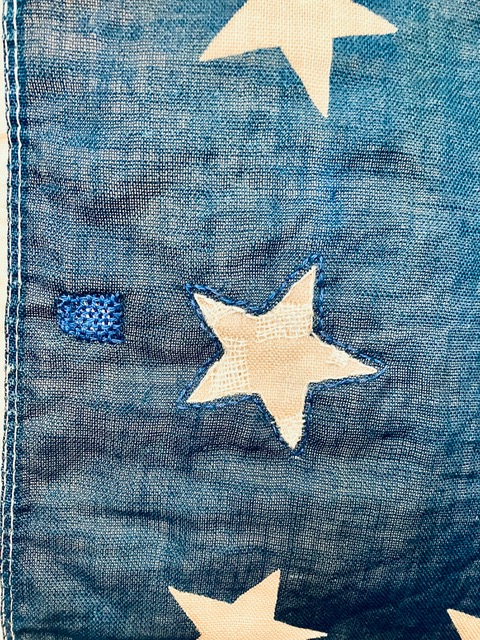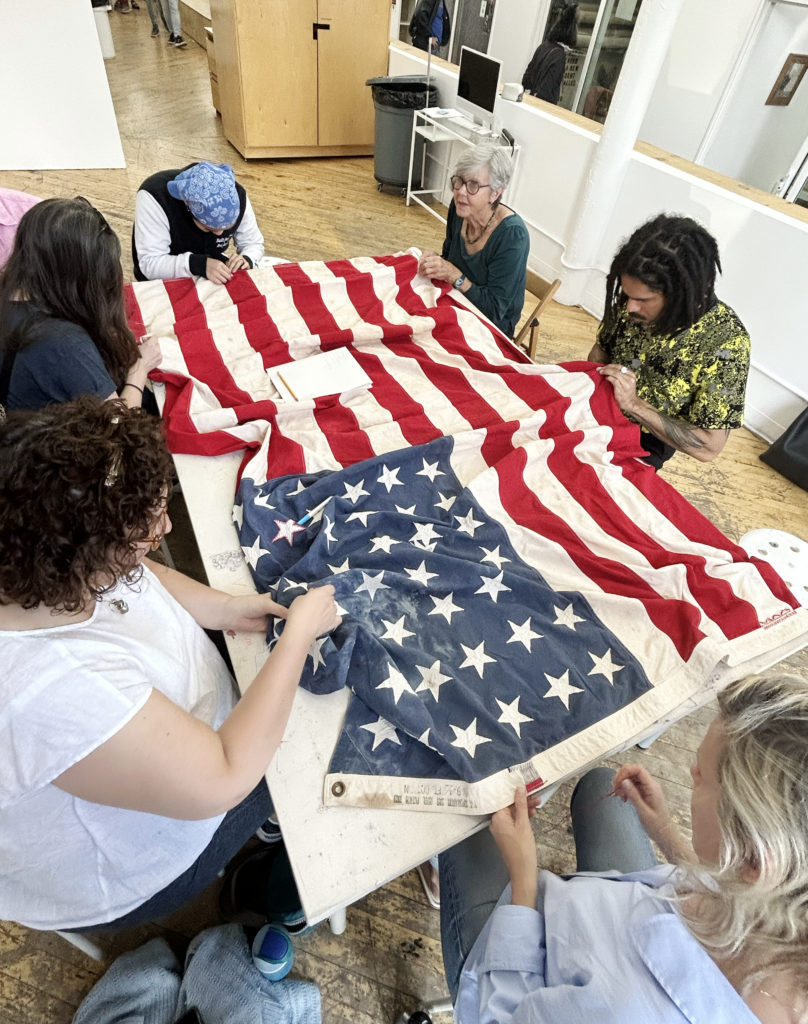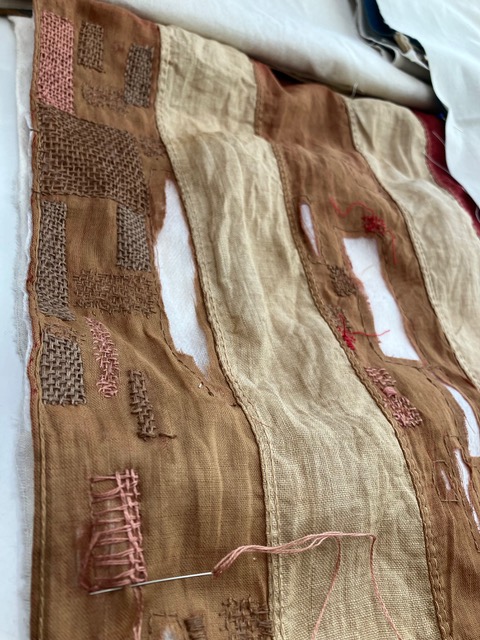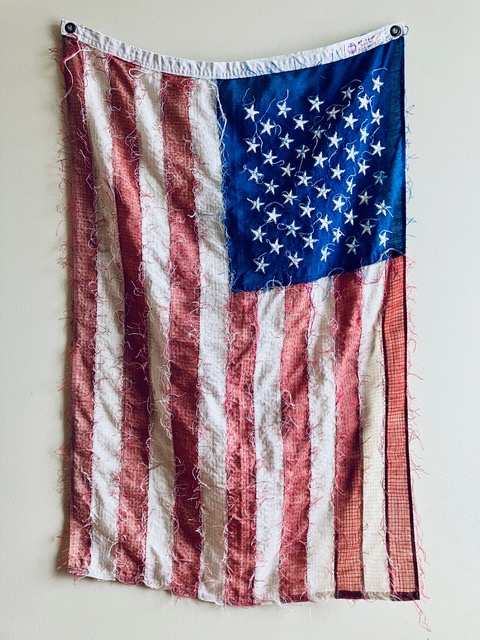WIP Artist Highlight: Winnie van der Rijn
[This conversation was edited for brevity.]
Julie Schumacher: I want to talk to you a little bit about your work as a multidisciplinary artist and, of course, textile work, but maybe first you can tell me about your relationship with the American flag.
Winnie van der Rijn: So, I grew up in a military family. My father was in the Air Force for his entire career, and some of the time I spent on military bases. My parents are very patriotic. It was an older version of what patriotism was. My mother literally cries every time she sees an American flag. And, living on a base, you become very judgy about the treatment of flags as there are lots of rules and regulations, and any time a flag is tattered or worn, it is decommissioned and then retired and discarded in a very ceremonial, respectful way.
My father passed away in 2021. I grew up in a conservative military family, but I'm myself quite liberal and deeply feminist but incredibly respectful. I had a great relationship with my dad—sometimes challenging, as most people have occasionally challenging relationships with their parents. And it [growing up in a conservative military family] was really interesting to me and really put a light on this attempt I am now having to reconcile these parts of myself.
Mourning is a really interesting thing. And having this opportunity to have a continued conversation with my father about things that I'm not sure we would have discussed if he were alive, but I could hear his voice in my head after he passed. And so, it wasn't that I was just reaffirming my thinking—it was really kind of reflecting on who he was and the legacy he left and what I learned from him and his deep love for the country. And I started looking at the flag as a symbol of freedom and looking for what this freedom was.

I'm an artist of opportunity, so I work with the materials that present themselves to me and the ideas. […] And, then I have these conversations in my head with my dad, and I'm doing my grieving. And the political world is upsetting to me. And, then, I meet a friend who hands me a bag of flags, and she says, I thought you might be able to use these. I work in mostly previously used materials—I don't really like to use fresh materials. I'm trying to drastically decrease my footprint. […] So, she hands me this bag of flags, and usually, I keep my acquired things dirty.
Like, the history of their dirt and their grime—I'm interested in that. I like that. I think it gives them character and color. I'd never try to clean them or take them back to their original form. And so when she gave me this bag of flags, I felt very different towards them—they were in very interesting states of disrepair, and it kind of broke my heart. And I was surprised by that. So, I washed them by hand, and some of them started to fall apart in my hands, which I thought was interesting. And I feel as an artist, one of the things I do is I think that damage is an opportunity, which is also why I work in used materials. When I see something damaged, I can make a choice. I can try and reinvent it. I can try and repair it. I can try and embrace its distress. And all of those things are options. I do a lot of mending.
So, these flags, when I saw them, I thought I was considering what my responsibility was because I'm an artist, but I'm also a military child. But I'm also an American, but I'm also an activist, but I'm also an archivist. What is my responsibility? And what's my responsibility to the country, to my father, to the material, to textiles? So, I've been treating each one differently depending on how it speaks to me.
And that is how I approach a lot of my art because I like to iterate. I do something once, and then I have a slightly different material, and I approach it a different way. What would happen if…? What if…? So with these flags, one of the things I'm thinking is that there are multiple ways we could consider and change something and reorganize it and look at damage and look at opportunity and look at where to go from there.
[…] So, when I iterate, I'm trying to reimagine, and I want to invite people in to reimagine with me because doing this work in a private space is kind of just a conversation with my father.
But as we are approaching an election, I feel that we're pretty separate, that a whole lot of things in the world have led us to look more at our differences than our similarities, and I think we're all more similar than we are different and that none of us are getting through this alone. And I feel that if you sit down and talk with people about what you have in common, then you can create trust. And if you create trust, then you can be vulnerable enough to talk about the things you don't have in common with some [with] civility and respect, mutual respect, and that is really what we should be doing. So, I wanted to bring this project more into a public sphere so that I could have those conversations with people, and I want my intentions to be understood.
I've done a lot of reading about the flag and a lot of research about the rules or the laws. And one of the things that it talks about most, no matter what you do with the flag, is doing it out of respect. And this work for me is respectful. And I think that if people engage with it and talk to me about it, then that can be understood, but it might appear without background information more divisive than my intention. And I think intention can change everything.
This project, in my mind, mending history—it's not all about the current political climate. It's how we find ourselves and how we move forward and what we want and how do you mend something.
Someone asked me if I was repairing. I said I'm not really repairing. Repairing is taking something back to its original form. When you read about [repairing] a flag, you know it's supposed to be with similar materials, and it's supposed to be invisible. I want this mending to be visible, and I want it to be community-based.

I know your work is concerned with dissolving, taking apart, decomposition, and rebuilding and construction. But the language that you're using when you speak about this project is “mending.” When I think of mending, to me, it feels there's a bit of tenderness in that idea. There's handling, and a sense of healing implied.
It's very related to healing, yeah. And it's something I think we need now.
I do—I like to take apart. I like to dissolve. I like to disappear. But part of that is also, for me, a deep investigation. This [flag] is a symbol. Where does the symbolism lie? Is it symbolizing a true reflection of beliefs? We have a constitution that has amendments because things change, and we make adjustments. And so, it's really just using it as a visual opportunity—but it's also deeply symbolic in our country. What would we change if we could? What do we think the deeply true parts are? And how can we come together?
I am always more about the questions than the answers. In previous projects, when I iterate, I'm not saying this is the answer. I don't have the answer. I think we have to have the questions and see where that takes us.
I'm far more interested in collaboration and what I can do with somebody than what I can do alone. And my hands really like to work, so I work a lot, and I'm very prolific. But I'm much more interested in the conversation. And what we can do together because I think that is where magic can happen in art. And to not have a controlled outcome but to just pursue the investigation and the opportunity and the what if and the why not and the how could we—deliberately, but with openness.

You spoke of an “older patriotism.” What is patriotism to you?
So, for me, I wouldn't call myself a patriot. It's hard for me to even—it's taken me some time to even say the word because the current usage doesn't reflect my beliefs.
To me, I think showing rebellion, showing respect, showing critique of a system I think indicates that you believe that it's worth looking at, saving, changing, fixing, repairing. I don't know the answer. But I have love of country, and [patriotism is] hard for me to say because it's viewed in a certain way, and that makes me sad.
Because it doesn't include my deeply liberal feminist beliefs, and I feel that by considering and critiquing something, you're actually showing true love and patriotism because you're saying this is worth it. I'm not just performing it.When I was in residency here [at Textile Arts Center], there was a poster that said, The role of the artist is to make the revolution irresistible. And I read it every day I was here for nine months. And it started to make me feel like I was a revolutionary, and I work with very small, ubiquitous things because if I make the revolution irresistible, what good is that if I don't also make it accessible? I want it to be accessible, and it's accessible to anybody. And so that's kind of what I want in the community opportunity, and I haven't done this before. Like, who knows what's gonna happen? Maybe we’ll start a revolution.
